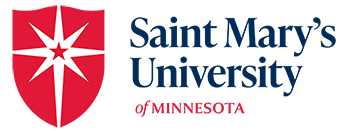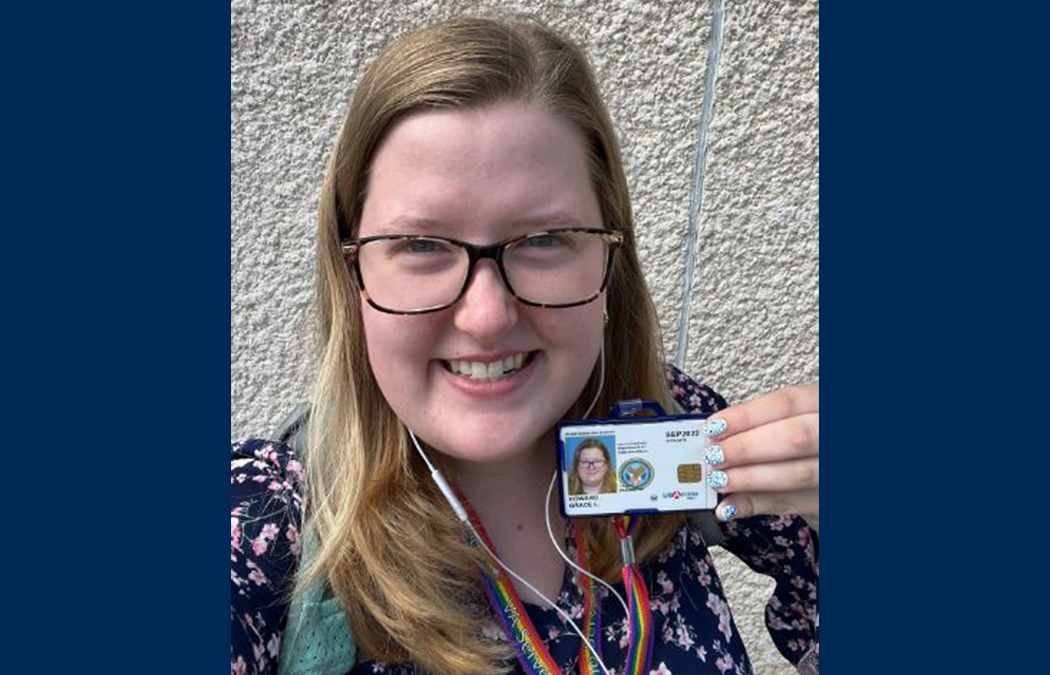Name: Grace Howard
Year: Senior (Class of 2023)
Major: Psychology
Internship site: Minneapolis VA (Veterans Affairs) Medical Center, Service to Science Scholars Research Program (SSS-RP)
What were your duties during the internship?
My internship focused on mental health research that is being conducted at the Minneapolis VA Medical Center. As such, I had the great opportunity to have two mentors who are both clinician investigators at the VA. This means that they, as clinical psychologists, divide their time between research and clinical practice. I worked with Dr. Carol Chu, who is a suicide risk and prevention researcher, and Dr. Jacob Finn, who is a TBI (traumatic brain injury) rehabilitation and outcomes researcher. I got to meet with both of them regularly and have conversations about their work, their areas of research, and what it’s like to be a clinical psychologist in a healthcare setting. I found these meetings extremely helpful, but I was also happy to help out on projects like data entry, creation of materials related to participant retention, and creation of materials for studies (ex: procedural checklist and entering questions into software used for ecological momentary assessment, or app-based questionnaires). I also spent time catching up on the body of literature on both my mentors’ fields so that I would have a better theoretical understanding from which to build. My cohort attended professional development seminars, research seminars, and a weekly class on data analysis and visualization using R and R-Studio in addition to our various responsibilities to our mentors and their projects. The professional development seminars were very helpful, as we went over lab structure, grants, posters, how to give an elevator pitch, and most importantly, some of what to expect from being a research-oriented clinical psychologist.
What did you learn during your internship?
In addition to the skills that I developed, I learned what a career as a clinical psychologist can look like in the real world, and especially outside the world of university professorship. It opened my eyes to a lot of possibilities I hadn’t considered. More importantly, I got a feel for whether I found careers like those of my mentors appealing. For me, this experience taught me that I do want to be a clinical psychologist, and gave me some professional skills for reaching that goal. I learned what to look for in graduate programs for research, and I took the GRE in preparation for applications. I learned about research grants and how research is funded, which gave me helpful insight into administrative expectations for a career similar to that of my mentors.
I also learned that I know more than I thought I did. I wasn’t sure, going into the program, how prepared I would be compared to the others in my cohort, some of whom were already admitted to doctoral programs. I have to say that I realized through my internship that I was ready far beyond my own expectations and that I was capable of actually being helpful and contributing to real-life, professional-level research.
Finally, I learned useful skills, including some basic R and R-Studio skills for data analysis and visualization, professional-development skills, and strengthened my research skills! It was extremely beneficial to me to have the opportunity to discuss my mentors’ research with them and to be able to ask them both theoretical and practical questions ranging from “how is this part theorized to work with this other thing” to “why use this scale over another scale” and “how reliable is this scale?”
How did the work connect to your education at Saint Mary’s?
I was constantly drawing on everything I learned in my classes at Saint Mary’s. I was so thankful for my experiences here that allowed me to be so prepared for a research internship like the one in which I participated. I can find connections between almost every psychology class I took and the skills I used in my internship: general research skills and knowledge of different measures from scientific research in psychology, interviewing skills from clinical and counseling psychology, research methods and process knowledge from the body image collaborative research lab, data analysis skills from quantitative analysis, and much more. My mentors made comments on how they were impressed that they didn’t have to explain certain parts of the research process to me, and I was happy to be able to engage in discussion with them on a more knowledgeable level. As a part of the internship, my cohort attended data analysis and visualization seminars that used R-Studio as the software. I had no clue how to use R or code at all before this experience, but I found myself helping to explain it to others because my professors had prepared me to think critically and understand the analysis, even if I was completely new to the program.
Overall, I found that my psychology education at Saint Mary’s prepared me amazingly well for this internship, surpassing my own expectations.
How will this experience help you after you graduate from Saint Mary’s?
This experience has helped me decide what I want my next steps to be after graduation and how to reach them. More than that, I know that having had the opportunity to take part in a research internship like the one I did at the Minneapolis VA Medical Center this summer will be a great help in showing my preparation and skills for graduate programs that will be looking at my experience. I know that I will draw heavily on this experience in terms of having professional and applied experience already in my chosen field. I do think that the most important thing it will help me with is confidence. I know, because I did this internship, that I can meet standards and contribute to psychology research in a professional setting.

